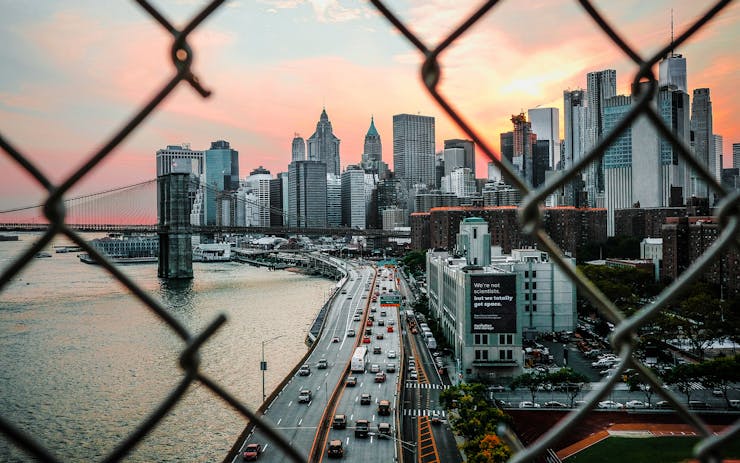In an announcement that could bring criminal justice relief to thousands of New Yorkers, Brooklyn District Attorney Eric Gonzalez said on Friday that his office will allow nearly 20,000 low-level cannabis convictions to be wiped away.
Gonzalez and his counterpart in Manhattan announced earlier this year that they would decline to prosecute most cases involving low-level cannabis crimes such as possession and public consumption. But thousands of people still carry convictions from before the policy shift took effect.
“It’s a little unfair to say we’re no longer prosecuting these cases but to have these folks carry these convictions for the rest of their lives,” Gonzalez told the Associated Press ahead of Friday’s announcement. Convictions can impede individuals’ efforts to secure housing, land a job, pursue higher education, or claim public benefits.
The new plan won’t automatically erase past convictions. Instead, Gonzalez is asking individuals with misdemeanors or violations to ask a court to expunge the charges. He said he expects his office to consent to the request in the vast majority of cases.
Under my Office’s new initiative, individuals w/ a low-level conviction for #marijuana possession will have the opportunity to erase that criminal record completely. I will share additional details about our plan later this afternoon @LRBC_Online. #StayTuned#Justice2020https://t.co/U8xFI1vtds
— Eric Gonzalez (@BrooklynDA) September 7, 2018
Gonzalez has long worked to scale down the office’s prosecution of minor cannabis crimes. In 2014, under then-District Attorney Ken Thompson, he implemented a policy encouraging the office to deprioritize cases of simple cannabis possession. In an opinion piece last year, he said the shift “freed up police officers and prosecutors to focus on serious threats to public safety.”
“We don’t have to wait for legalization to begin efforts to correct the serious harms that communities and individuals experienced because of biased enforcement.”
“It is improving the relationship between law enforcement and the community,” he wrote. “And it most importantly—it is making our criminal justice system fairer.”
New York City has some of the starkest racial disparities in cannabis arrests, according to an analysis published by the New York Times earlier this year. In Manhattan, for example, black people were arrested for cannabis at 15 times the rate of white people.
“The city has proven itself completely unwilling to end discriminatory marijuana possession policing,” Councilman Rory Lancman, who heads the City Council’s justice committee, said after the Times analysis was published. “The situation is becoming intolerable.”
Broader reform at the state level could be coming soon. Both the state Democratic Party and a report by Gov. Andrew Cuomo’s administration have endorsed legalization, and state officials this week embarked on a monthlong series of “listening sessions” across the state to discuss how to legalize and regulate cannabis for adult use. “The input will assist the Regulated Marijuana Workgroup in drafting legislation for an adult-use marijuana program for the legislature to consider in the upcoming session,” the program’s webpage says.
Legalization has also emerged as a defining issue in the state’s gubernatorial race, with Democratic challenger Cynthia Nixon positioning herself as the race’s pro-legalization candidate while incumbent Cuomo, who has largely declined to move on cannabis reform during his tenure, scrambles to catch up.
New York has had a medical cannabis program since the state passed legislation in 2014. The program’s rollout, however, was notoriously slow, preventing many patients from gaining access to medicine until recently.
Efforts to address past cannabis convictions in other jurisdictions are ongoing. In California, hundreds of thousands of cases qualify for sentence reductions or outright dismissal under the state’s 2016 legalization measure, Proposition 64, although only a small portion of eligible individuals have come forward to seek relief. A pending bill in the Legislature is designed to speed the process.
Some local officials have also taken steps to clear criminal cannabis records. The San Francisco DA’s office has said it will clear thousands of convictions dating back decades. Seattle, meanwhile, is in the midst of trying to persuade a court to allow past misdemeanor convictions to be vacated automatically—with no action required by affected individuals—although judges haven’t yet ruled whether the plan can move forward.
“It’s long past time we remedy the drug policies of yesteryear,” Seattle City Attorney Pete Holmes said earlier this year in a statement announcing the dismissal effort, “and this is one small step to right the injustices of a drug war that has primarily targeted people of color.”
Drug reform groups cheered Brooklyn’s new initiative on Friday, calling the district attorney’s announcement encouraging.
“Addressing low-level marijuana arrest records that continue to haunt New Yorkers for decades is a critical component of marijuana policy reform that truly acknowledges the immense harm caused by prohibition,” Kassandra Frederique, the New York State Director of the Drug Policy Alliance, said in a statement. “We hope this proactive shift by DA Gonzalez will spark similar efforts from District Attorneys across the state. Marijuana legalization is needed and coming, but we don’t have to wait for legalization to begin efforts to correct the serious harms that communities and individuals experienced because of biased enforcement.”




